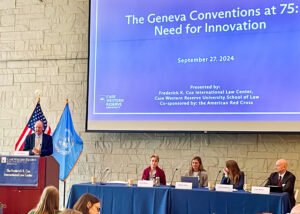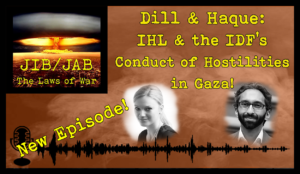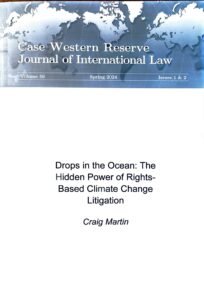 I have launched a new substack, entitled Law in Crisis, which some might find interesting. As the masthead explains, it is a forum for “musings on how law can help our response to crises, and how to respond to the crisis in law itself – use of force and armed conflict, climate change and security, AI and security, constitutional and int’l human rights, and the rule of law more generally.” The plan is to publish an essay of between one to two thousand words at least once a week.
I have launched a new substack, entitled Law in Crisis, which some might find interesting. As the masthead explains, it is a forum for “musings on how law can help our response to crises, and how to respond to the crisis in law itself – use of force and armed conflict, climate change and security, AI and security, constitutional and int’l human rights, and the rule of law more generally.” The plan is to publish an essay of between one to two thousand words at least once a week.
Human Rights
Discussing Autonomous Weapons Systems and IHL at Case Western Law
 Case Western University School of Law’s annual international law symposium this year focused on the question of whether the Geneva Conventions, enjoying their 75th Anniversary, need to be updated to deal with new challenges, including the application of IHL to space, expanding transnational conflicts with non-state actors, cyber-war, and the development and deployment of fully autonomous weapons systems. The conference began with a closed experts group meeting to discuss the development of a white paper on the issues, followed by an open conference with panels on each of the major topics.
Case Western University School of Law’s annual international law symposium this year focused on the question of whether the Geneva Conventions, enjoying their 75th Anniversary, need to be updated to deal with new challenges, including the application of IHL to space, expanding transnational conflicts with non-state actors, cyber-war, and the development and deployment of fully autonomous weapons systems. The conference began with a closed experts group meeting to discuss the development of a white paper on the issues, followed by an open conference with panels on each of the major topics.
My panel, with Laurie Blank of Emory Univ. Law, Milena Sterio of Cleveland Univ. Law, and Romina Morello of the ICRC, fielded questions from Paul Williams of American Univ. Law, on whether, and how, the Geneva Conventions might need to be updated in some form to better regulate the use of autonomous weapons systems. My article on the subject will be published next year in the Case Western Journal of International Law. Great conference.
JIB/JAB: Episode 39 – Dill and Haque on IHL and the Conduct of the IDF in Gaza
 In this episode I discussed the question of whether it is possible now, while hostilities are still ongoing, to assess whether some aspects of the IDF’s conduct of hostilities may be in violation of IHL, with two of the top experts on the issues: Janina Dill of the University of Oxford and Adil Haque of Rutgers Law School. For more on the episode, including all the supporting reading material, visit the website!
In this episode I discussed the question of whether it is possible now, while hostilities are still ongoing, to assess whether some aspects of the IDF’s conduct of hostilities may be in violation of IHL, with two of the top experts on the issues: Janina Dill of the University of Oxford and Adil Haque of Rutgers Law School. For more on the episode, including all the supporting reading material, visit the website!
The Power of Rights-Based Climate Change Litigation
 My law review article exploring the influence and impact of rights-based climate change litigation has now been published in the Case Western Reserve Journal of International Law, and the full article can be downloaded from SSRN. The abstract is posted below:
My law review article exploring the influence and impact of rights-based climate change litigation has now been published in the Case Western Reserve Journal of International Law, and the full article can be downloaded from SSRN. The abstract is posted below:
An increasing number of legal challenges to government climate change policies are being advanced on the basis that states are violating the human rights or constitutional rights of applicants. A number of high-profile cases in Europe have upheld such claims and ordered governments to adjust their policies. But questions remain regarding how effective such rights-based cases may be in the effort to enforce climate change law obligations or encourage government responses to the crisis. This Article explores how such rights-based cases may exercise greater influence than is typically understood.
After explaining briefly the relevant human rights and climate change law, this Article examines in some detail a sample of rights-based climate cases that reflect a common pattern of features that provide the basis for such an explanation. The cases illustrate the incorporation of both international human rights law norms, and international climate change law obligations and standards, which are used to assess the legitimacy of government climate change policy. The courts increasingly rely upon the science of climate change institutions and the arguments and doctrines developed by foreign courts and international tribunals, including new doctrines for rejecting typical “drop in the ocean” causation and justiciability arguments traditionally relied upon to dismiss climate change cases.
